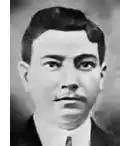José Ignacio Quintón
José Ignacio Quintón (February 1, 1881 – December 19, 1925), was a pianist and composer of danzas.
José Ignacio Quintón | |
|---|---|
 | |
| Background information | |
| Born | February 1, 1881 Caguas, Puerto Rico |
| Died | December 19, 1925 (aged 44) Coamo, Puerto Rico |
| Genres | danza |
| Occupation(s) | composer and pianist |
Early years
Quintón was born in Caguas, Puerto Rico into a musically talented family. His father, a Frenchman by the name of Juan Bautista Quintón y Luzón, was a graduate of the Conservatory of Music of Paris. The elder Quintón was also a composer and organist who became his son's first music teacher. When Quintón was two years old his family moved to the town of Coamo. In Coamo, he took piano lessons with Ernesto del Castillo. In 1890, when he was nine years old, he performed his first concert. When he was only eleven years old he accompanied the famed Cuban violinist Claudio Brindis de Salas Garrido on the piano in a concert and was highly acclaimed by him. Quintón continued to study music and was the director of his school's band. During his spare time he gave piano and violin lessons.[1][2][3][4]
By 1917, Quintón had taught himself to read English. This enabled him to read and study English language music books and magazines of the time thus becoming informed of the styles and compositions of Debussy, Ravel and other composers.[4][2][1]
Danzas
| External audio | |
|---|---|
The first danzas that Quintón composed were Confía (Trust), Mi estrella (My Star) and Amor imposible (Impossible Love). He received many awards and the recognition of his fellow musicians for the compositions Cuarteto para instrumentos de cuerdas (Quartet for string instruments), Variaciones sobre un tema de Hummel (Variations on a theme of Hummel) and many others. He also wrote Misa de Requiem as a tribute to the late composer of danzas Ángel Mislan.[1][2][3]
His greatest composition was the danza El Coquí. In this danza he was able to simulate the sound of the coquí, a tiny frog with a unique call found in Puerto Rico.[1][2][3][5][6]
Legacy
José Ignacio Quintón died on December 19, 1925 in the town of Coamo where he is buried. The town of Coamo has honored his memory by naming one of its principal avenues after him and by conserving the house in which he lived as a historical landmark. The José I. Quintón Academy of Music is located in Coamo.[1][2][3] The Centro Musical Criollo José Ignacio Quintón, a museum is located in Caguas.[7]
References
- "Biografia de José Ignacio Quintón". Biografias y Vidas .com (in Spanish). Retrieved June 23, 2023.
- Centro Musical Criollo José Ignacio Quintón
- La Danza
- "José Ignacio Quintón". EnciclopediaPR (in Spanish). May 19, 2023. Retrieved June 23, 2023.
- "Danzas por una Patria libre y feliz". Fundación Nacional para la Cultura Popular (in Spanish). May 13, 2019. Retrieved June 23, 2023.
- Smith, J. (2003). Tangos, milongas and other Latin-American dances: for solo piano. Dover Music Scores Series. Dover. p. 76. ISBN 978-0-486-42787-4. Retrieved June 23, 2023.
- Ravid, N.L. (2007). Let's Go Puerto Rico 3rd Edition. Let's Go: Puerto Rico (in Italian). St. Martin's Press. p. 147. ISBN 978-0-312-37447-1. Retrieved June 23, 2023.